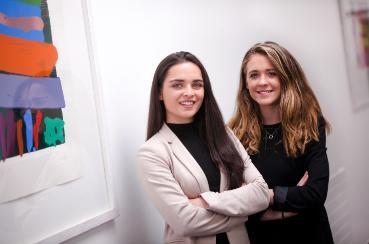| Code | CK213 |
|---|---|
| Duration | 4 years |
| Teaching Mode | Full-time |
| Qualifications | BSc (Hons) |
| NFQ Level | Level 8 |
| Fees | Student Contribution + Capitation: €3,138 See Fees and Costs for full details. |
| CAO Points | 2023: 452 |
| CAO Points Range | 2023: 452 - 589 |
Course Outline
BSc (Hons) Food Marketing & Entrepreneurship offers a unique combination of business and science, providing graduates with the skills to work in an exciting, fast-paced industry. During Years 1-3 you will study various modules across a range of disciplines including Food Business, Marketing, Food Policy, Management, Economics, Microbiology, Accounting, Law, and Nutrition.
This will provide you with a well-rounded education which will prepare you for a career in the dynamic food industry and other sectors, by nurturing innovation and entrepreneurship skills, by building knowledge of the food and nutrition sciences, by developing skills to assess business viability, and by promoting an understanding of consumer market trends and marketing strategies.
Year 3 will also offer opportunity to avail of a 6-month placement, to further develop practical skills. As an alternative to placement, you will also have the opportunity to apply to partake in the Erasmus programme, spending 6 months in either France (Rennes 1), Germany (Konstanz), Italy (Bologna) or the Netherlands (Utrecht) conducting your research project.
In final year, in addition to studying core modules across business disciplines, you will also have the opportunity to choose modules which most align with your interests and anticipated career path. All business and food science subjects will be taught at an introductory level at first, so do not be concerned if you have not taken science or business subjects at the Leaving Certificate. Graduates will learn skills in strategic decision-making, innovation, enterprise and knowledge management, delivered through an integrated range of subjects that support successful personal and entrepreneurial business development.
The course is designed to consider the challenges faced by businesses and expose students to the concepts, theories and experience of practice that explain how the business world operates. Practical applications in the form of group and individual projects, along with placement and study abroad opportunities will be an integral part of your learning experience. The programme is built on UCC’s international reputation in food education and research and taught by lecturers who are internationally recognised in their fields of expertise.
Modules
Year 1 Modules (all 5 credits):
FE1017 Introduction to Food Marketing; FE1016 Introduction to Food Business; FE1030 Introduction to International Food Policy; FE2200 Introduction to Food Supply Chain Management; EC1500 Ethics and Economic Decision Making for Food Business; EC1503 Economic Analysis for Food Business; FS1011 Introduction to Food Science and Technology; MB1901 Introduction to Food and Industrial Microbiology; AC1116 Financial Accounting; LW1108 Introduction to the Legal System; LW1109 Introduction to Business Law; MA1100 Introductory Mathematics for Business.
Year 2 Modules:
Digital Food Marketing and Branding; Placement Preparation plan; Quantitative Research for Food; Food Sustainability; Introduction to Management Accounting; Introduction to Information Systems; Information Systems for the Networked Enterprise; Principles of Food Science and Technology; Topics in Food Quality and Legislation; Fundamentals of Nutrition Part 1; Introduction to Business Statistics; Methods of Business Statistics.
Year 3 Modules:
Market-oriented New Food Product Innovation; Food Market Research Methods; Food Enterprise Management; Understanding Supply Chain Management; Science and Technology of Food Systems B; Fundamentals of Food Packaging; Food and Industrial Microbiology I; Enterprise and Innovation; Fundamentals of Nutrition Part 2; Sensory Evaluation for Food and Nutritional Sciences;
Electives
Transferrable skills - Food Business and Development research project; Work Placement
Year 4 Modules:
Core
Food Marketing and Entrepreneurship (FYP); Consumer Behaviour in Food Markets ; International Food Retail Marketing; Global Food Supply Chain Management; Global Food Policy; Strategic Marketing; Strategic Management;Accounting in Business Public Health Nutrition (5 credits)
Electives
Advanced Food Packaging; Cereals and Related Beverages B; Financial Reporting 1; Financial Reporting 2; Food Security and the Developing World; Co-operatives, Food and Rural Sustainability; International Marketing Management.
Having successfully completed this course you should be able to:
- comprehend and resolve a variety of marketing and business challenges within a fast-paced business environment
- communicate effectively to business and food science communities
- recognise the importance of good science in business success
- contribute, either in a leadership or supporting role, to the effective functioning of a team
Academic Programme Catalogue
See the Academic Programme Catalogue for the complete and up-to-date content for this course. Note that the modules for all courses are subject to change from year-to-year. For complete descriptions of individual modules, see the Book of Modules.
Course Practicalities
Expected lecture hours: In a typical week most students will have 12 hours of lectures.
Expected reading hours: Self-directed learning is an important aspect of University education and the student will need to supplement in-class learning with the study of relevant reading materials. Study time is also used to work in teams to prepare project reports and essays. As a general rule of thumb for every hour in class, the student should complete three hours of self-directed learning.
Expected lab/practical hours: In a typical week most students will have 3-6 hours of seminars, tutorials and practical classes.
Why Choose This Course
Placement Testimonials
If you are interested in developing your passion for both business and food, this is the course for you. It will enable you to pursue your interests and ambitions in the most important home-grown sector in the Irish economy.
As a student in this course, we aim to develop your creative, analytical, communication and professional skills. You will learn how to gather market intelligence, interpret data from multiple sources, identify market opportunities and communicate with target markets via social media. This will support you in developing a skill set that fosters leadership and innovation.
You will get opportunities to test your technical knowledge (in both business and science) through projects and work placement. Skills such as working with and for others, responding to briefs, working to deadlines, using initiative, communicating and presenting in a professional manner will also be developed. These transferable skills will form an important part of your armoury when seeking employment and advancing your career in both the food and non-food sectors.
The programme offers a unique combination of business and the food and nutritional sciences. Our graduates are ideally positioned to take advances in food and nutritional sciences and translate them into real business opportunities by responding to market trends through the process of innovation. Furthermore, the programme is built on UCC’s international reputation in food education and research and includes many lecturers who are internationally recognised in their field of expertise.
Throughout the duration of the course, you will have various opportunities to engage directly with industry and work on projects that will provide you with real life experience and useful employability skills.
BSc Food Marketing and Entrepreneurship programme's recent partnership with the SuperValu Food Academy
Current students on the BSc Food Marketing and Entrepreneurship were delighted to participate in a recent partnership with the SuperValu Food Academy Food Producers programme.
The Food Academy is a longstanding Musgrave initiative that helps develop and support emerging food & drink brands by giving producers their first step into the retail sector. The SuperValu Food Academy promotes producers and their products in Supervalu stores across the country in a manner that is creative, local, committed to quality, and sustainable.
Throughout February and March, 1st and 2nd-year FME students, mentored by 3rd and 4th years, gained invaluable experience from working closely with Food Academy producers, providing expertise and creative input in the areas of social media, marketing, consumer & product market research and packaging redesign. Significant business benefits were realised by SuperValu Food Academy producers, with increased brand awareness and social media engagement, new packaging developments and better consumer insights allowing for more informed decision making.
Students learned what it means to be a food entrepreneur and experienced the passion, creativity, challenges and joys that entrepreneurship entails. In addition, the initiative provided students with the opportunity to develop their communication, interpersonal, creativity, and networking skills while applying in-class learning to real-life businesses. Our Food Business and Development Department and the BSc Food Marketing and Entrepreneurship degree is looking forward to a continued relationship with the Musgrave group and the Academy.
Placement or Study Abroad Information
An integral part of this programme is a six-month industrial placement during Year 3. The placement offers an excellent opportunity to draw on your knowledge and skills in performing tasks in specific work contexts. This will enhance your work capabilities and offers you a chance to reflect on and better understand these.
Placement opportunities are both national and international, and past placements have included:
- Aldi (Buying Office)
- Nestle
- Cully & Sully
- Dairygold
- Dunnes Stores (Buying Office)
- Glenilen
- Glanbia (Supply Chain)
- Kepak Group
- Musgrave Group (Own Brand, Buying, Marketing)
- Rich Dairies (USA)
- Silver Pail
Alternatively, as part of the Erasmus programme, students can apply to spend the six-months studying abroad in either a German, Dutch, Italian or French university. As well as providing an engaging learning and social experience, studying abroad will provide insight into other markets and cultures, further boosting employability, particularly in organisations which rely heavily on export markets.
Skills and Careers Information
The skills acquired will ensure that our graduates can position themselves to find employment in the thriving indigenous food sector and exploit career opportunities within fast-moving consumer goods markets both here and abroad.
International growth will underpin demand for graduates in areas such as consumer research, product marketing, key account management, and supply-chain management not only in Ireland but worldwide. And with suitable experience, there is always the prospect of setting up your own business!
The most recent Graduate Employability Survey (UCC 2020 Graduate Outcome Survey) points to 96% of graduates being in full-time employment or pursuing further study within six months of completing this degree. Many of our graduates commence their careers on graduate programmes with companies such as Kerry, Musgrave, Aldi, Kepak, Bord Bia, and IBEC amongst others. Career prospects cover a wide range of functional areas including Brand Management (e.g. Kerry); Social Media Marketing (e.g. Tesco); Buying (e.g. Musgrave, Aldi, Dunnes); Key Account Management (e.g. General Mills); New Product Development (e.g. Musgrave, Kepak); Category Management (e.g. Danone); Digital Strategy (e.g. Google, Lidl); State Agencies (e.g. Bord Bia); and Supply Chain (e.g. Sodexo).
A variety of masters programmes in related disciplines are available to graduates of the programme.
Requirements
Leaving Certificate Entry Requirements
At least six subjects must be presented. Minimum grade H5 in two subjects and minimum grade O6/H7 in four other subjects. English and Irish are requirements for all programmes unless the applicant is exempt from Irish.
Applicants will need to meet the following minimum entry requirements:
| English | Irish | Other Language | Maths |
|---|---|---|---|
| O6/H7 | O6/H7 | O6/H7 | O6/H7 |
EU/EFTA/UK Qualifications
EU/EFTA/UK applicants presenting an equivalent school-leaving qualification should review the EU/EFTA/UK Applicants page for information on equivalent grades and how to prove their level of English.
Mature Students
To compete through the mature entry route, applicants must be 23 years of age on or before 1 January of the application year and apply online via the CAO by 1 February. The application should include a statement of interest. Irish Leaving Certificate Maths (or equivalent) is recommended. Applicants may also be called for interview.
Further information on applying as a mature student is available on the Mature Applicants and Mature Student Entry support pages.
QQI FET Entry
Applicants who meet the required level of distinctions in required subjects can apply for entry to this course using specific QQI FET qualifications. Please review the Programme Requirements on our Information for QQI FET Applicants page for information on related QQI courses, and visit Access UCC’s QQI/FET Entry section for further support.
Non-EU Applicants
Non-EU applicants are expected to have educational qualifications of a standard equivalent to the Irish Leaving Certificate. In addition, where such applicants are non-native speakers of the English language they must satisfy the university of their competency in the English language.
To verify if you meet the minimum academic and language requirements visit our qualification comparison page and refer to our International Office page for more information.
Fees and Costs
- Whether you are an EU or Non-EU student will affect the course fees applicable to you. See more information on EU Fees, Non-EU Fees, or Free Fees Status.
- The State will pay the tuition fees for EU students who are eligible under the Free Fees Scheme. The annual student contribution and capitation fees are payable by the student.
- See the Fee Schedule to find out the course fee.
- Check out scholarships that may be available to you.
- Explore our Nurturing Bright Futures free online course (Module 5) to learn about managing your money as a student and budgeting for university life.
How To Apply
Irish and European (EU/EFTA/UK) Applicants
Apply via the CAO. See the CAO Handbook for useful information on applying through the CAO.
Mature Applicants
Apply via the CAO by 1 February. To apply for a place as a mature student, you must be 23 years of age on or before 1 January of the year of entry.
QQI/FET Applicants
Apply via the CAO. See our QQI/FET Applicants page for information on the Quality and Qualifications Ireland (QQI) Further Education and Training (FET) application process.
Non-EU Applicants
If you are from outside the EU/EFTA/UK, apply online via the UCC Apply portal. See our International Office page for more information.















